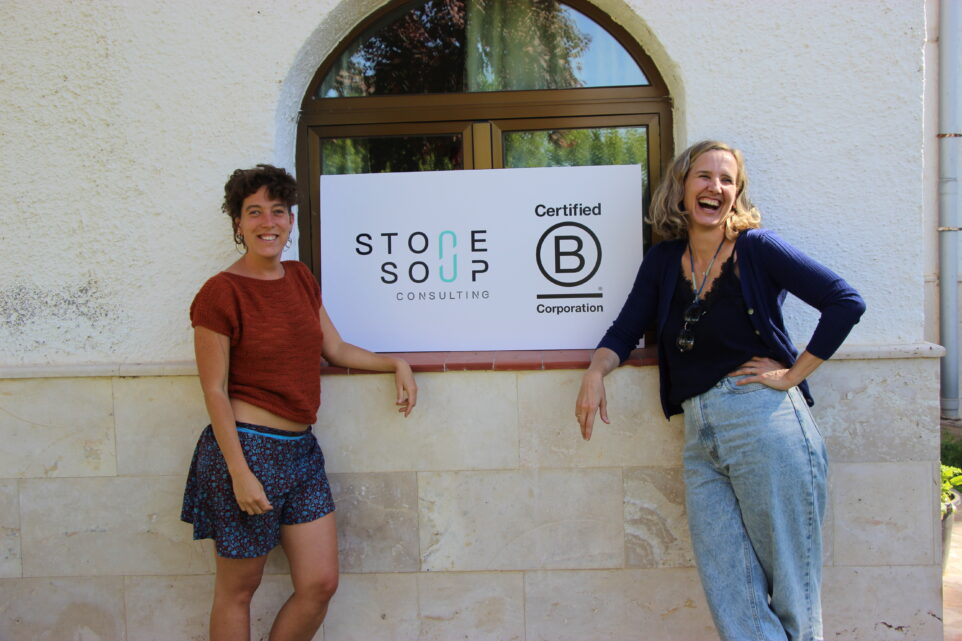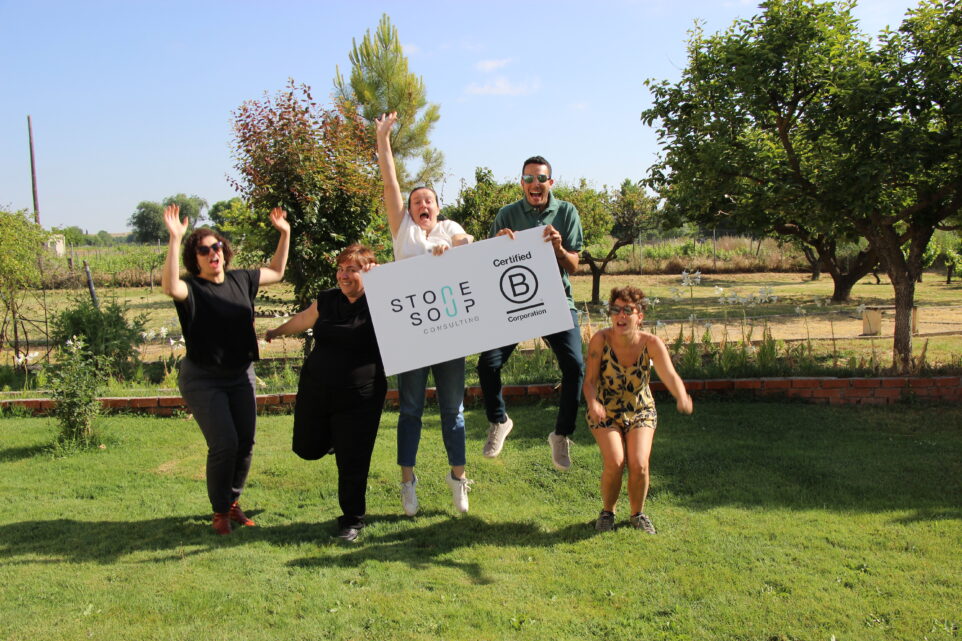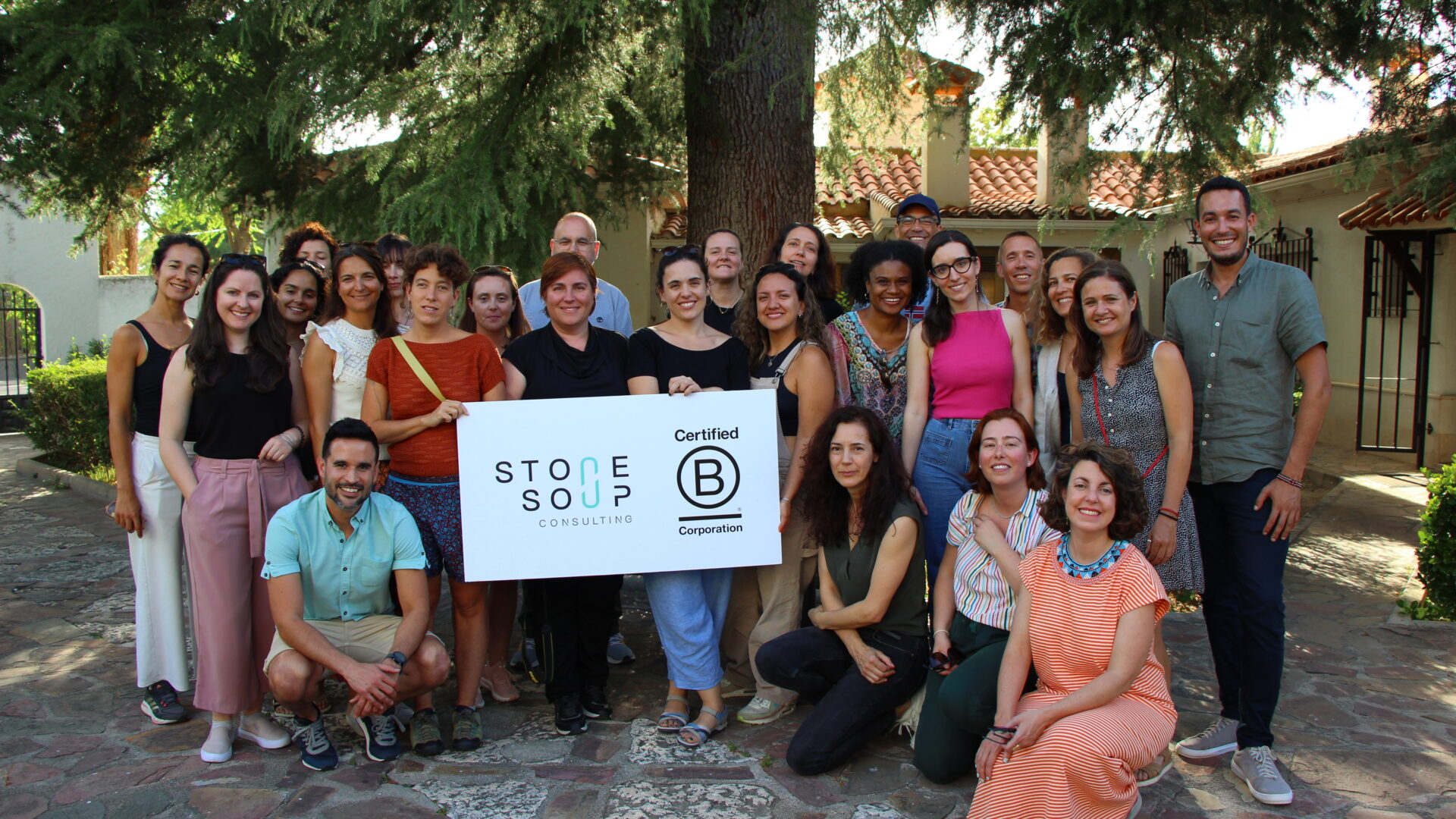B Corp recertification makes Stone Soup a better company
June 18th 2024
By Rosa Matos
Internal Policies and Practices Director
Stone Soup Consulting
As a certified B Corp, going through the whole recertification process was not uncharted waters for Stone Soup, but we have grown and changed, and so has B Lab’s challenging and demanding assessment and reviewing process. We could not but celebrate and reflect on our recent journey to recertification.
When we received confirmation of our B Corp recertification in May, and earned an encouraging 126.6 score, we could not help but celebrate and reflect on how much this score meant of hard work over the past year when we started preparing to recertify. It was our second one since we certified 8 years ago, so the process was not totally new to us, but we were mindful of how much we had changed and evolved, and so had B Lab’s certification, that has been seeking public feedback and reviewing its standards.
It was a long and demanding process, especially in the first months preparing and completing the B Impact Assessment, which is the first step towards B Corp Certification.
How did the recertification go?
It all started in early 2023, some months before the recertification due date. We first reactivated our B Corp taskforce, which included two partners and our Administrative and Financial Coordinator (later joined by our new Head of Finance and IT, and other partners). Then, we agreed on goals, on each one’s responsibilities, and on our work plan and digital resources, and just rolled-up our sleeves to move it forward, as efficiently as possible. We knew from the experience gained with our previous assessments, how it is both detailed and strict, but also dynamic, since the set of questions to be addressed evolve and adapt according to our specific business model. We also knew we would have to work systematically to be able to quickly move through all the B Impact Assessment sections and agree collectively on our answers (some not so straightforward, requiring careful consideration to reflect our situation and position). In parallel, we would need to work swiftly to gather evidence to respond to each request, and prepare and customise all supporting documentation, while being open to those unexpected questions that would challenge us further, generating new requests and duties for the taskforce and other Stone Soup colleagues. It was only almost six months later when we were finally ready to press the submit button, and B Lab’s evaluation stage began. This was another long one, with its checks and reviews, and regular interactions, finally closed, after more than one year, with the recertification decision and the signature of the B Corp Agreement.
But what is the B Impact Assessment?
The B Impact Assessment is the digital tool used by B Lab to help companies measure, manage, and improve positive impact performance for the environment, communities, customers, suppliers, employees, and shareholders. The B Impact Assessment is also one of the main pillars of the B Lab’s standards, together with the Risk Standards, and the additional Multinational Company Standards & Baseline Requirements (just for large companies generating $5B+ in annual revenue). Companies are required a verified score of 80 to gain a B Corp Certification.

Then, what exactly does Stone Soup’s B Impact score mean?
Let us break down Stone Soup’s overall score of 126.6 into the five main categories of the B Impact Assessment and specific scores: governance (20.6), workers (34.1), community (23.3), environment (5.7), and customers (42.6). These scores recognize Stone Soup’s model and practices in different ways.
- Governance recognises our mission to optimise the social impact of organisations, and our engagement around our impact, and our ethics and transparency, and our ability to protect our mission on the long-term and consider stakeholders in our decision making through Stone Soup’s corporate documents.
- Workers evaluates our contributions to the financial security, health, wellness and safety, career development, and engagement and satisfaction of the Stone Soup community members.
- Community highlights in particular our engagement with and impact on our community, mainly in topics such as diversity, equity and inclusion, and economic impact.
- Environment evaluates Stone Soup’s environmental management practices as well as the direct impact of our operations on the air, climate, water, land, and biodiversity. Although, our environmental impact is relatively low, as we operate primarily through remote workspaces, the low score in this dimension also reflects all we still have to do to reduce it further and our commitment to work towards net-zero emissions by 2030.
- Customers recognises Stone Soup’s customer stewardship, but especially our support for underserved and purpose driven initiatives, and our contribution to improve the social impact of our client organisations and to serving in need populations.
An important step further – The B Lab’s Risk review
B Lab’s Risk Standards assess eligibility for certification based on a review procedure for companies that provide products or services to clients operating in industries that are deemed controversial. These are classified in the Disclosure Questionnaire category in the B Impact Assessment. This was the case for Stone Soup, since we had clients operating in the Charity lotteries, For-profit higher education and Fossil Fuels (no coal, oil sands) industries. Although Stone Soup is not involved in the controversial activities, and this Disclosure does not imply that we are violating the standards of B Corp Certification, B Lab considers we have the potential to contribute indirectly to the negative impact of the controversial industry. Therefore, B Lab has reviewed the practices we have put in place to ensure that our impact is aimed at decreasing the negative impacts of the industry. These practices, namely Stone Soup’s screening and collective decision making on potential clients, are now included on the Disclosure report that was made public on our profile.

A great incentive to keep on reviewing and evolving our collective practice
Completing the B Impact Assessment is also a unique opportunity to learn and improve, and to kick start or further develop or formalise practices that were either just planned to be developed or needed a push. One example is our new set of internal agreements and guidelines on Anti-harassment and Whistleblower protection, and our new Whistleblower platform (we are opening to the Stone Soup community this month), which are a step further in our commitments, namely with ethics and diversity and inclusion, and which we started developing back then. Another recent agreement triggered by this recertification is our new internal People and Well-being Policy, that formally sets Stone Soup’s principles, practice and guidelines to foster the development and well-being of people in our community. In both examples, going through the B Impact Assessment offered critical insights to the internal participative construction and the collective agreements that are laid down in our guidance.
B Lab’s evolving standards
B Lab’s continuous effort to evolve the tools and strategies for measuring impact gives us increased trust in the certification process and that it is meeting principles of inclusion, independence, and credibility. B Lab’s standards are governed by an independent global multi-stakeholder Advisory Council with specific expertise in responsible and sustainable business, backed by B Lab, and informed by research and multi-stakeholder input. B Lab standards were revised six times since it began in 2006, and, in 2020, B Lab launched a multi-year review (which we recently had the chance to contribute to) aiming to advance the standards further. We really look forward to the next version and to their implementation beyond 2025.
Our next recertification – in May 2027, is just around the corner. We are very sure Stone Soup will be quite different by then, as learning and adapting continuously is in our own nature, and we are also very confident the B Corp recertification process will be a much relevant pilar in the struggle to make all business a force for good.

